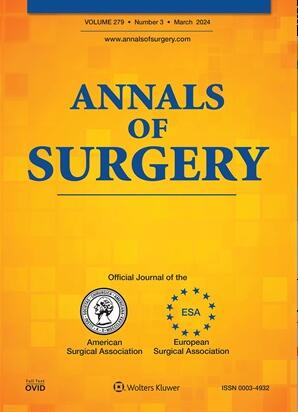普外科训练计划中的文化探索:范围综述。
IF 6.4
1区 医学
Q1 SURGERY
引用次数: 0
摘要
本研究的目的是系统地探讨文化是如何在普外科住院医师培训项目中被概念化、调查和衡量的。关于普外科住院医师培训项目文化的研究主要集中在检查个体参数,如虐待和倦怠,而不是全面分析整体文化、气候或学习环境。方法检索PubMed、Embase、Cochrane、CINAHL、APA PsycInfo 5个数据库。搜索结果包括与文化、环境、气候和普通外科培训相关的受控词汇和关键字。两名审稿人进行标题和摘要筛选和全文审查。进行了叙事综合。结果7项研究符合入选标准。大多数研究(n=6, 85.7%)在美国进行。单中心研究4项(57.1%),多中心研究3项(42.9%)。只有两项研究定义了文化、气候或学习环境,三项研究使用有效的工具进行了测量。纳入的研究探讨了文化的各种组成部分和结果,包括教学、培训和学习机会;工作量、资源和支持;幸福感、压力和自杀意念;违反工作时间和倦怠;虐待、骚扰、歧视和虐待;工作满意度和人员流失。结论:本综述揭示了普外科培训文献中文化评估和表征的方式存在显著的异质性。一个更统一的方法来探索组织文化在普外科培训计划将允许该领域的进步。本文章由计算机程序翻译,如有差异,请以英文原文为准。
An Exploration of Culture in General Surgery Training Programs: A Scoping Review.
OBJECTIVE
The objective of this study was to systematically explore how culture has been conceptualized, investigated, and measured within general surgery residency training programs.
SUMMARY BACKGROUND DATA
Research on the culture of general surgery residency training programs has primarily focused on examining individual parameters, such as mistreatment and burnout, rather than comprehensively analyzing the overall culture, climate, or learning environment.
METHODS
Five databases (PubMed, Embase, Cochrane, CINAHL, APA PsycInfo) were searched. The searches included a combination of controlled vocabulary and keyword terms related to culture, environment, climate, and general surgery training. Two reviewers performed title and abstract screening and full text review. A narrative synthesis was performed.
RESULTS
Seven studies met the eligibility criteria and were included. Most studies (n=6, 85.7%) were conducted in the United States. Four studies (57.1%) were single-center and three (42.9%) were multi-center studies. Only two studies defined and three measured culture, climate, or the learning environment using validated instruments. The included studies explored various components and outcomes of culture, including teaching, training, and learning opportunities; workload, resources, and support; well-being, stress, and suicidal ideation; duty hour violations and burnout; mistreatment, harassment, discrimination, and abuse; and job satisfaction and attrition.
CONCLUSIONS
This scoping review revealed significant heterogeneity in the ways in which culture has been evaluated and characterized within the general surgery training literature. A more unified approach to exploring organizational culture in general surgery training programs would allow for advancement of the field.
求助全文
通过发布文献求助,成功后即可免费获取论文全文。
去求助
来源期刊

Annals of surgery
医学-外科
CiteScore
14.40
自引率
4.40%
发文量
687
审稿时长
4 months
期刊介绍:
The Annals of Surgery is a renowned surgery journal, recognized globally for its extensive scholarly references. It serves as a valuable resource for the international medical community by disseminating knowledge regarding important developments in surgical science and practice. Surgeons regularly turn to the Annals of Surgery to stay updated on innovative practices and techniques. The journal also offers special editorial features such as "Advances in Surgical Technique," offering timely coverage of ongoing clinical issues. Additionally, the journal publishes monthly review articles that address the latest concerns in surgical practice.
 求助内容:
求助内容: 应助结果提醒方式:
应助结果提醒方式:


